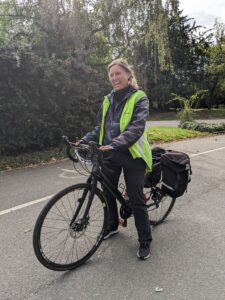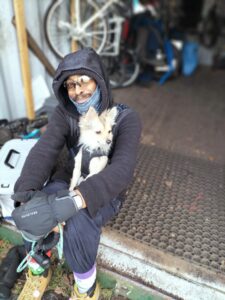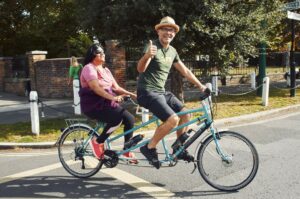WfW instructors help people to cycle more easily and more often.
This is the second article in our new series, by Charles Critchell, which explore every aspect of our London-based cycle sessions and led rides. Since our cycle operations started in 2007, our impactful programmes have helped thousands of Disabled people to try cycling in a safe and supportive environment. This has led to participants experiencing a range of health, wellbeing, and social benefits. This series is designed to bring our collective skills, knowledge, and experience together to create better opportunities for all who want to try inclusive cycling.
Charles Critchell is an active travel professional and a non-Disabled cyclist. For this series, Charles worked closely with Wheels for Wellbeing to learn more about the charity’s cycle sessions and led-rides with the aim of sharing the experiences of its staff, volunteers, and cyclists.
“I’m constantly assessing risk, it’s the biggest part of the job”. True to his word, even as he talks to me, Session Manager Eric maintains a watchful eye on the handful of cyclists making their way around the track in front of us. It’s a quiet day at the Croydon Sports Arena, the outermost London venue Wheels for Wellbeing use for their cycle sessions. This may be because the previous day’s sessions had been fully booked – 90 cyclists attending over three, one-hour sessions. This is quite a feat of management for Eric and his fellow instructors Lincoln and Beata, who are each responsible for a maximum of ten cyclists at a time. Today provides the opportunity to work more closely with several regular cyclists, and to check the status of the range of cycles lined up at the trackside.
A qualified Bikeability instructor, Eric initially volunteered at Wheels for Wellbeing before becoming a paid instructor first, then Croydon Session Manager over ten years ago. During that time, he’s witnessed the charity’s fleet of cycles both expand and improve in quality, while the introduction of a booking system during the COVID pandemic has ensured that each cyclist receives the level of attention most suited to them: “One lady had arthritic fingers and, therefore, difficulty braking so we had to work around that”. Another participant, currently on the track, is susceptible to panic attacks from thunder. As a result, Eric has advised his supporter against bringing him should the weather forecast look ominous.
Out on the track, fellow instructor Lincoln tells me that, though he’s only been supporting the Croydon sessions for a year, his association with the charity extends back much further: “I’m a co-director at Brixton Cycles and first heard about Wheels in 2007 from Janet Paske (Wheels for Wellbeing’s founder), who was a customer”. Since then, Lincoln has not only helped repair an assortment of the charity’s cycles but more recently has worked closely with some of its members: “I started as a volunteer, riding a side-by-side tandem with a Deafblind cyclist and learnt tactile signing so that we were able to communicate”. For Lincoln (now a paid Instructor), South London’s cycling community has been a big part of his life, and he enjoys “putting something back in” through his work at the charity.

Another of the Croydon session instructors is Beata, who also instructs at the Herne Hill Velodrome sessions, in addition to managing sessions at the charity’s third venue, Ladywell Day Centre, each Friday. Like Eric and Lincoln, Beata began at the charity as a volunteer. She started at Ladywell soon after she moved to the UK from Poland with her young family, but was soon assisting a Session Manager at Herne Hill Velodrome, who recognised her potential and encouraged her to “ride and learn about different cycles”. While developing her technical capabilities, Beata also developed her interpersonal skills; including the ability to quickly understand how to best respond to each person’s individual needs: “The role has definitely taught me patience and the importance of understanding people on their own terms”.
Understanding the specific needs of different cyclists is critical, perhaps nowhere more so than at the Herne Hill Velodrome sessions. A week after I visit Eric and his team at Croydon, I’m watching as Beata offers encouragement to a student from nearby Turney School who is tentatively maneuvering a Pashley trike on the velodrome’s tarmac court. The famous velodrome has been Wheels for Wellbeing’s main base of operations for over a decade, coinciding with the time that restoration work on the historic venue began. Aside from hosting sessions three days a week – including ones with educational partners such as Turney School – the charity’s led rides begin and end here, while the bulk of the charity’s non-standard cycle fleet is stored in five shipping containers located outside the main track.
Positioned at the gate between the velodrome’s main track and the smaller inner track is Simon, the Herne Hill Session Manager. Simon tells me that he “loves the chaotic nature of inclusive sessions”, something which he manages very effectively with his relaxed, informal style. Simon began his career in IT, however, working long hours behind a desk led him to search for something more fulfilling. Initially applying for a cycle maintenance course, he qualified as a mechanic at Bikeworks in East London, prior to joining their All-Ability Club programme. Recognising that roles in the inclusive cycling sector could provide the requisite fulfillment, Simon soon began volunteering with Wheels for Wellbeing before being appointed as Herne Hill Session Manager in the Summer of 2022.
Like Eric (Croydon Session Manager), Simon is constantly alert to risks including those which can originate from the shared use of the velodrome. Though the tarmac court and inner track are relatively secure, it is not uncommon for some participants to attempt to leave by crossing the busy outer track where other cyclists train at speed. Simon believes that getting participants familiar with the venue is conducive to helping them get the most out of sessions: “Sometimes, it’s easier for participants to sit in the stands and watch to begin with, especially if they don’t like crowds”. Furthermore, Simon relays that “sometimes people simply aren’t in the mood to cycle, and that’s OK”.

Assisting Simon and Beata are Instructors and Volunteers who typically rotate depending on the day of the session. On Thursdays this includes Paul, an instructor and retired quantity surveyor who has been attending for just over a year, while Phil, a fellow instructor, joins on Mondays. Phil is a long-standing supporter of the charity and even longer standing Velodrome attendee. He first began coming to the Herne Hill Velodrome with his son Fred – now a world champion professional cyclist – in 2007. When Wheels for Wellbeing became based at the Velodrome in 2012, Phil met Wheels for Wellbeing Director Isabelle Clement on the committee of Friends of Herne Hill which, at the time, worked tirelessly to save and restore the velodrome. He is a long-standing track coach with the Velodrome and became an Instructor for Wheels for Wellbeing during the COVID pandemic.
Phil specializes in working with blind cyclists, including Norman with whom he regularly cycles on a tandem. More recently, Phil has started working with another Visually Impaired cyclist and has recently run a workshop alongside a Visual Impairment Awareness trainer with the aim of helping other Instructors and Volunteers to improve their knowledge of the area.

Leaving Simon and Phil, I make my way across the velodrome’s outer track where I’m let through the gate adjacent to the clubhouse by Sandra, one of the charity’s longest serving Volunteers. Before the online booking system was introduced, Sandra used to help attendees and supporters with paper registration and cash payments but today is on hand to greet participants and to control access across the main track: “Crossing the track when it is being used by track cyclists is dangerous and there could be accidents; so ensuring people’s safety is absolutely paramount”.
Though Wheels for Wellbeing’s instructors and volunteers come from a variety of different backgrounds, they share one common purpose: to help every participant to gain as much value from their sessions as possible. There are three keys to this: first, to use risk assessments as a tool to ensure that participants not only feel safe (but are safe) under the charity’s duty of care; second, to build a rapport with participants with a view to understanding their specific needs (after all, they’re the expert in how their bodies work); and third, to draw upon the team’s expertise and vast fleet of cycles to strategize how these specific needs can be best met.
While the team are committed to helping each cyclist successfully reach their personal goal, their unifying aim is to ensure that everyone leaves sessions and led-rides having had a fun and positive experience which ultimately encourages them to cycle more. This is certainly the case for Wheels for Wellbeing’s instructors, each of whom began at the charity as a volunteer before progressing to their respective position. Herne Hill Session Manager Simon perhaps captures the group’s sentiments best: “For me, it’s hugely rewarding to not only work with such a wide range of interesting people but to have the opportunity to positively impact their daily lives”.
Wheels for Wellbeing is always aiming to expand its offer to Disabled Cyclists which includes providing opportunities for volunteers and instructors to join us. If you are interested in applying, please contact info@wheelsforwellbeing.co.uk for more information.
